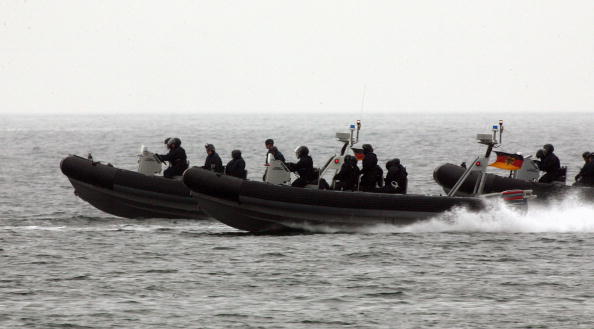Saudi Arabia To Buy German Patrol Boats
The Kingdom is expected to spend $2 billion on ships from a Bremen-based dockyard.

Saudi Arabia is looking into buying patrol boats worth 1.5 billion euros ($2 billion) from a German firm, and appears to have won the Berlin government’s approval despite widespread public criticism of arms deals, a newspaper reported on Sunday.
The Arab kingdom was exploring a deal to buy the ships, each costing between 10 and 25 million euros, from Bremen-based dockyard Luerssen, Bild am Sonntag newspaper said.
Arms exports are a sensitive issue in Germany given the country’s Nazi past and the role arms makers like Krupp played in fuelling numerous 19th and 20th century wars.
Germany’s national security council, which includes Chancellor Angela Merkel and the ministers of defence, development, economy and foreign affairs, had already given the deal a preliminary nod, according to the newspaper.
The council has to approve such deals in Germany but its decisions are not made public. A spokeswoman for the economy ministry, which oversees such deals, declined to comment.
No one at Luerssen was immediately available for comment.
The newspaper did not say why Saudi Arabia might be seeking the vessels.
But Saudi Arabia’s foe Iran has repeatedly threatened to close the Strait of Hormuz, a route for oil exports from the Gulf, if Iranian nuclear sites are attacked by Israel, which believes Tehran is trying to develop an atomic bomb – a charge Tehran denies.
While Iran’s navy lacks a modern combat capability, its Revolutionary Guards have a wide range of more modern missile patrol boats armed with Chinese and Iranian-made anti-ship missiles, Western defence analysts say.
With less than eight months to go until Germany’s federal elections, the news drew criticism from opposition politicians.
“The government apparently wants to totally arm Saudi Arabia and has not learned anything from the public protests against weapons deliveries to this country,” said Thomas Oppermann, parliamentary floor leader for the opposition Social Democrats.
Germany has refrained from exporting heavy weapons to Gulf states in the past because of its relationship with Israel and more recently because of the Arab Spring revolts.
However, according to a government report, Berlin approved the export of 5.4 billion euros worth of arms in 2011, after studying requests from different countries, a 14 percent increase from the previous year. Of those arms, 42 per cent went to countries outside the European Union or NATO.
In December, Bild am Sonntag reported the German government was close to completing a 100-million-euro arms deal for “Dingo” armoured vehicles and Der Spiegel magazine reported Saudi Arabia wanted to buy several hundred BOXER armoured fighting vehicles.
In 2011, Saudi Arabian security sources said the country was buying hundreds of tanks from Germany in a multi-billion euro deal that German opposition lawmakers at the time said contravened export guidelines for military hardware.
After World War Two, successive West German and later united German governments placed tight restrictions on arms exports, especially to regions where there were armed conflicts or where human rights were poorly respected.
“It’s time to stop all weapons exports to Saudi Arabia,” said Jan van Aken of the Left party, adding his party would make that demand in parliament.
